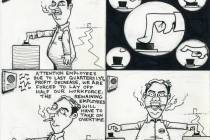Tim Burke: What are alternatives to staying on entitlements?
In previous columns, we examined how someone on entitlements may receive the equivalent of almost $15 per hour in benefits and how they can’t afford to return to work on a minimum wage.
We have also discussed how the lack of child care assistance prevents many parents from returning to work. Last week, we discussed training options so that Nevadans can obtain certifications in career fields that pay higher than minimum wage.
The goal should be to have a system in place that allows someone on assistance to return to work and not lose their existing benefits. It is easy to be cynical and say that those on benefits are just “using the system,” lazy, and that they do not want to return to work.
In some cases, that is true. For a minority of people, they have been on entitlements for so long that they have lost that desire to return to work. Not working and just getting by has become their lifestyle. But sitting at home and not working has effects that are not always easy to identify.
In many cases, not working and living on entitlements affects our self-perception and our self-esteem.
You no longer interact with fellow employees and your world becomes much smaller and closed in. You may find yourself dealing with depression and health issues. You live from crisis to crisis with no resources to overcome issues like car or home repairs. You may turn to drugs or alcohol to kill time and ease the pain of depression. Your eating habits may deteriorate and you may gain weight and become more sedentary.
While others may view you as being on a permanent vacation they have no appreciation that you are trapped in a lifestyle that has no straightforward way out.
Our current system penalizes those receiving entitlements for returning to work. Benefits are cut or diminished entirely when someone returns to work. If there is a clear and well thought-out system in place that allows people to return to work the benefits would be far-reaching.
First, it would help that person get out of the entitlement trap and back to working as a productive member of our society. It helps their family and breaks the cycle of being on entitlements by showing that you don’t have to stay on them. It returns someone to being a tax contributor and not a tax receiver. It increases their self-esteem and they become healthier and happier.
But how can this be accomplished? Two proposals have gained some traction the last few years but both are flawed. The most common proposal we hear about is raising the minimum wage to $15 per hour. While in theory that would put someone where they need to be to get off entitlements, it brings a multitude of problems that might outweigh the theoretical benefits.
Raising the minimum wage results in higher costs to businesses. Small businesses simply cannot afford to pay higher wages without raising prices. Higher prices often bring less business. Less business means less income to pay the higher wages. Large businesses are moving toward automated services to eliminate entry-level jobs. A higher minimum wage expense would accelerate that movement.
Another proposal is to replace current welfare entitlement programs with a Universal Basic Income. This idea was originally proposed in the 1960’s. The Nixon administration almost brought America the first basic income program, the Family Assistance Plan. The proposal passed the House but failed in the Senate. The premise of a basic income plan is that every person would receive an annual income from the government. That income would replace all current welfare entitlement programs.
Surprisingly, the proposal has the most support from conservatives who see an opportunity to eliminate the costly federal bureaucracy that administers current welfare programs. But opponents point out that the real costs are difficult to predict. Beyond costs, another obstacle to implementing such a policy stems from its potential impact on productivity and the labor force.
A third alternative is to allow those on entitlements to retain their benefits but they must attend a job training program or obtain employment if they meet certain age and health requirements. Essentially that single mom with two kids would be allowed to attend school or go to work at a minimum wage job and still keep a significant percentage of her benefits.
If someone is receiving the equivalent of $15 an hour in benefits and takes an entry level job of $8 per hour they would retain the difference in benefits. Add in a voucher program for child care and you have created a way for that mom to re-enter the workforce without penalizing her to do so.
Our current system actually discourages someone from returning to work. This alternative would return those on entitlements to the workforce or to get job training in a field that pays higher than minimum wage. It would also eliminate those that are using the system with no real interest in returning to work.
If you meet the age and health requirements you must go work or school or lose your benefits. A system that gives a clear path for someone to return to work without penalizing them benefits not only the person on entitlements but those paying the taxes that pay for those benefits. It’s only common sense but then again we are talking about government programs so common sense is often replaced by special interest groups, lobbyists, and politicians playing their political party games.
Tim Burke is a businessman, philanthropist, educator and Pahrump resident. Contact him at timstakenv@gmail.com
















